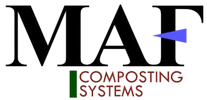Company:
City of Bunbury
Location:
WA Australia
Input materials:
15,000 tons per annum; green waste; municipal bin collection
Amount of MAF units ordered:
15 MAF units
Output:
Products for landscape supply
Previous production problems:
Bunbury Council needed to expand their facilities on their existing site utilising the existing space available. They were introducing a ‘third bin’ collection service (food waste) and therefore needed a cost effective method of processing both Bio Waste and green waste with no odour problems.
Reasoning for conversion to MAF:
A key success factor was the selection of a process that they knew would not be perfect to start with but was flexible enough for them to improve over time as they got more experience working with MAF. They have eliminated odour complaints and dealt with excessive waste volumes successfully. This demonstrates that the MAF way of doing things reduces risk and allows operators to adapt to unplanned events.
Results and conclusions:
In just over 6 months they have diverted 55% of their waste streams from landfill using the third bin collection system processed on MAF. Bunbury CC have diverted 6400 tonnes of waste in this time. It seems they will achieve 13,000 tonnes easily in their first full year, which is a great result. All this is material that was going to landfill before.
So positive are they on MAF’s capability they are now processing Bio Waste sludge’s mixed with green waste from WWTP, a milk and fruit juice factory. There were odour problems doing this previously but this stopped immediately on processing with MAF, according to Tony Battersby the CEO of Bunbury Council. In fact to quote Tony Battersby, “MAF is working brilliantly”.
